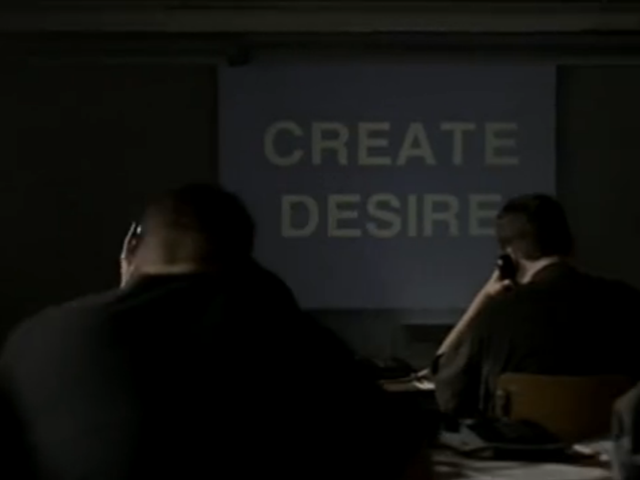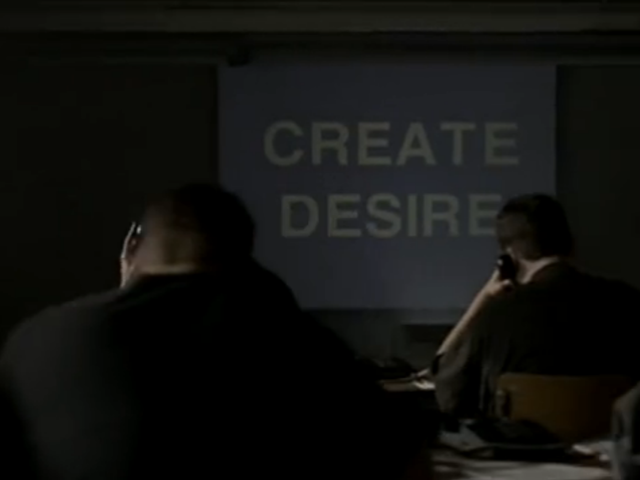The Best Time My Summer Job Left Me Nearly Incapable Of Feeling
by Sarah Hagi


After spending my entire adolescence working low-paying, part-time retail jobs, I decided I needed something high-paying and mature. Something full-time and somewhere I could sit down, preferably in front of a computer and not people.
I was 20 years old with very little meaningful job experience. At the beginning of 2010, my best friend died, and toward the end of 2010 I got a mysterious illness and almost died myself. By the summer of 2011, I was fully recovered, and felt fortunate to be alive. But I also had no degree, and zero life goals. I wasn’t exactly overwhelmed with options.
Desperately browsing through job listings, I found something that ticked off more than all the requirements I’d hoped for. “Would you like to lead the charge toward the future of ideas?” it asked. Well, sure! Benefits! An entire eight and a half dollars over minimum wage! Bonuses! Downtown!
Within two days of applying, I had a phone interview, conducted in both English and French, that lasted over an hour. The entire thing was serious and formal, as though to emphasize this was a “real” job. They asked what kind of experience I had and how I deal in stressful environments, and I answered with a smile, because I’d nervously googled “how to sound smart in a phone interview” the night before and learned that smiles can be “heard.”
“I’m very easygoing and positive,” I replied. At the time, I really did believe my relaxed attitude would be enough to deal with working tech support.
Exactly one week later, I had a face-to-face interview. The company was located in a giant building that loomed over the city like the Eye of Sauron. I was first given a tour of where I’d work if I was lucky enough to be hired. After passing tiny grey cubicle after cubicle, I was shown the “relaxation room,” where employees could unwind. Gesturing toward an Xbox locked in an anti-theft case with no controllers, the HR woman said, “There’ll be a foosball table here one day.” I worked there for two years, and there was never a foosball table. Or a controller.
Training was three weeks of total confusion. It was obvious upon meeting my co-workers that we were there because we couldn’t do much else. The job itself was sold as straightforward: customers would call when their device was acting up, and we would help them get it back running. What did I know about this mysterious device? Turns out it didn’t matter, because nobody knows. Most issues are solved by restarting.
Within two weeks of working the phones, a part of me knew I had made a grave mistake, but the “just happy to have money” part kept saying it would get better. Slowly, it dawned on me why I was getting paid as much as I was — my job was more or less to receive our company’s most abusive customers. I got used to being called “useless” in rural dialects of Quebec French. Once, I answered the phone for a man who gave a sigh of relief as soon as I said hello, and I was relieved for the half second before he said, “Finally, a white person! So sick of talking to those foreigners.” I didn’t tell him I wasn’t white.
Because I wasn’t selling anything, the company was losing money for each hour they employed my services. They made sure they got their money’s worth. It felt like every week my co-workers and I were given impossible metrics to uphold. Every aspect of our job — how long we’d spend on a call, how long we’d keep customers on hold, how long we’d take writing notes between calls — was meticulously tracked, and every week we would be expected to take more calls. But, as was emphasized in training, we were doing important work.
My hours were 3pm to 11pm. They promised me I’d be working day shifts in no time, but like the promise of a foosball table, it never happened. This made a social life difficult to schedule: my friends would text me to hang out and I would have to decline. Eventually they learned to stop texting me.
I learned to play video games. Before I started, I’d been the most casual of gamers. Suddenly, games were the only thing keeping me from breaking down completely. I would get home around midnight, too wired to sleep, and play until 3am. After completing quest after quest, I would go to bed feeling truly accomplished. Then I would wake up reluctantly around noon and remember that I had to leave for work in an hour, to spend all day and night listening to people yell at me to “fix the box.”
My only solace during those horrible evenings were my lunch breaks, which were actually dinner breaks, but saying “lunch” felt more hopeful. As you know, if you’ve ever worked a job with the aim of saving money, you’re always supposed to bring lunch from home, because food adds up. But bringing lunch from home would have meant spending more time in the building. I wrote off fast food as a self-care expense, and soon all my hours before lunch were spent thinking about what I’d eat. Usually I’d eat McDonald’s.
At my closest McDonald’s worked a soft-spoken, passive-aggressive man who didn’t quite understand that I didn’t want to form a bond with him. I just wanted my Big Mac. After many curt replies to his compliments on my scarf, he got the idea, and he was hostile in a way so soft I wanted to strangle him. One day, I ordered nuggets instead of a Big Mac. “Oh, not the regular,” he said, with a smile. “Looks like someone’s stepping outside the box.” I had become a regular at McDonald’s.
Throughout my tenure, my hours never changed. Neither did the level of abuse I received from customers, nor my gaming habits. Eventually all the crazy customer stories I’d shared with friends and family ceased to be amusing. By the end of my last summer there, the job had left me feeling deprived of most emotions.
Noticing I was stuck in an anhedonic loop, my mom sent me to our family doctor to see if I needed professional help. My doctor put me on medical leave so I didn’t have to decide whether or not I wanted to quit right away. “I think you’re kind of depressed and you’re gonna crash,” she told me, while writing out a prescription for a drug I never needed to take. I knew by the end of my leave that I had to go.
I was sent to see a therapist to help me “figure it all out.” I spent two sessions filling out personality tests in hopes of finding something I’d be better at doing than restarting various devices. I took the test results to heart, and followed the results given to me. It’s been nearly two years since I quit my job, and although I’ve never been more broke, I’m happy doing what I was apparently meant to do: write.
Sarah Hagi is currently under-employed.